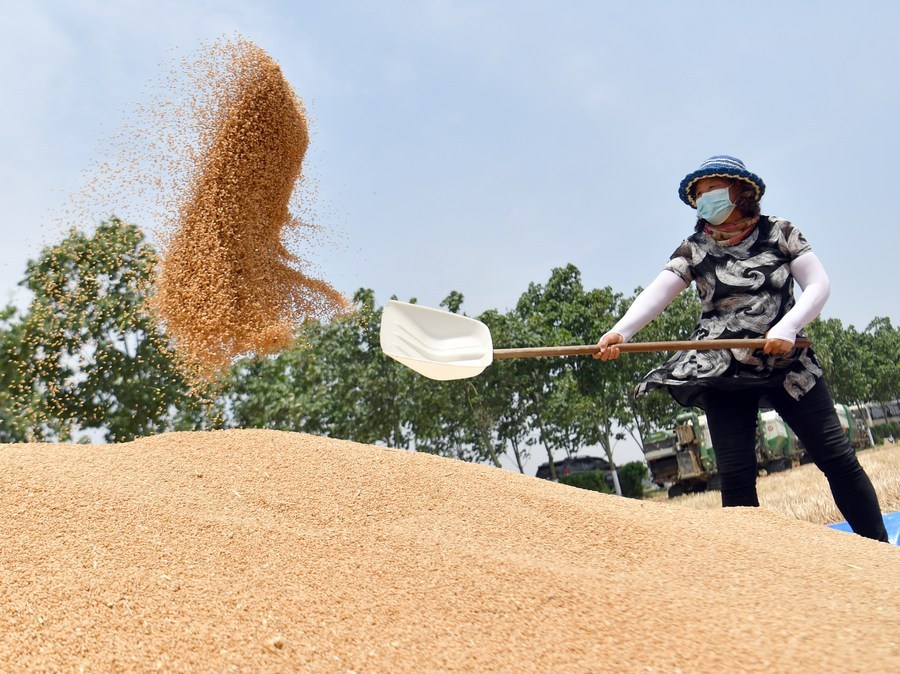
A farmer uses a shovel to separate grains of wheat from the husk in Zhangyao village of Erlang town in Xiping county, Central China's Henan province on May 26, 2020. (Photo: Xinhua)
Given its limited cultivable land and huge population, China has always emphasized the importance of preventing food wastage from the harvest, transportation, storage and food processing stages to the dining table.
So it is little wonder that the official document released after the conclusion of the Fifth Plenary Session of the 19th Communist Party of China Central Committee on Thursday highlighted the necessity of saving food and preventing food wastage.
In the past five years, China's annual grain output has been more than 650 million tons. Despite that, the document said China needs to ensure food security by improving the competitiveness of its agricultural sector, and revitalizing its villages. In fact, the "Clean Plate" campaign was launched recently to strike a balance between rapid urbanization and food security, which is important to feed China's 1.4 billion people at a time when it is promoting "green and sustainable development".
In spite of the impacts of the COVID-19 pandemic and massive floods in summer, the abundant rainfall this year has benefited the main grain-producing areas in North China and Northeast China, which would more or less offset the loss caused by floods in the Yangtze River basin. Thanks to a bumper summer harvest and a good one in autumn, the annual crop yield is expected to reach a new high this year.
China's total grain output has increased for 16 consecutive years since 2003-it was 663.84 million tons in 2019. As a result, the country enjoys absolute food security, particularly in staples (rice, wheat and corn); it has enough food grains in stock to feed the whole nation for one full year.
China enjoys surplus domestic food production, as supply of grains vastly outstrips demand. And since 2014, the government has been carrying out supply-side structural reforms to boost food quality instead of only seeking to increase output.
As preventing food wastage and saving food are not enough to ensure food security, China attaches great importance to becoming self-sufficient in food production. According to the National Bureau of Statistics, China uses 71 percent of its total farmland to grow rice, wheat and corn, and produces 10-20 million tons of surplus rice and wheat every year.
However, due to limited cultivable land, China has to import some other agricultural products to meet the people's needs, and has surpassed the United States as the world's largest importer of agricultural products, spending more than $180 billion every year to do so. Soybean forms the bulk of China's agricultural imports, reaching a peak of more than 95 million tons in 2017-which fell to about 90 million tons after the US launched the trade war against China in 2018.
As China's per capita GDP has crossed $10,000, Chinese people's demand for grains is expected to decline in the future with a corresponding increase in the demand for livestock products, including meat, eggs and milk, as seen in Asian developed countries such as Japan and the Republic of Korea. Also, since China's population is expected to peak around 2030, the pressure on the country to ensure food security will somewhat ease, though the demand for soybean as feed could see China importing up to 100 million tons of soybean every year.
China used to source most of its soybean imports from North and South America. But the drop in its imports from the US due to the Sino-US trade war has made it realize the importance of diversifying its import markets to ensure stable supply. Also, China's import of more than 90 million tons of soybean every year will unleash the agricultural potential of many countries, especially those along the Belt and Road in Southeast Asia and the Black Sea region such as Russia and Ukraine.
Although the total output of grains in the world exceeds demand, people in many places still suffer from hunger because their countries either don't produce enough food grains or cannot afford to import them from other countries. And fluctuations in the international markets worsen the situation, as was seen during the global financial crisis.
It is therefore necessary for China to be self-sufficient in staples and build a secure global agricultural supply chain by diversifying its import markets. And with a series of preferential policies for farmers and an affective "Clean Plate" campaign, China will continue to increase its food productivity and safeguard its food security.


